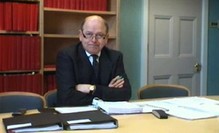 David Perry QC at the Leveson inquiry
David Perry QC at the Leveson inquiry David Perry QC told the Leveson inquiry that he was not made aware of any evidence "implicating any other individual employed by News International, other than Goodman and Muclaire".
The Leveson inquiry heard that notes seen by Perry indicated 180 potential targets of phone hacking, but it was considered that there was no evidence to pursue a case involving all of them.
The 2006 trial resulted in the jailing of News of the World royal editor Goodman and private investigator Mulcaire in January 2007. They admitted listening to voicemail messages left on the phones of royal aides Jamie Lowther-Pinkerton, private secretary to Princes William and Harry, and Helen Asprey, the Princes' personal secretary.
Giving evidence via video link from Northern Ireland, Perry told the inquiry: "In presenting a case, or preparing a case, the most important consideration is to keep the case manageable and for the presentation of the case to be simple for all concerned: defendants and courts and juries.
"By taking a sample of victims and including them within an indictment you get a picture of the criminality and it means that the sentencing in the event of a conviction can impose a sentence that reflects the scope of the criminality.
"It also means the case can be prepared more efficiently with more effective use of resources."
He later added: "It depends on the combination of circumstances and the strength of any evidence. Certainly in the context of looking at the material which we had in this case and the evidence available to us, I certainly don't think I saw anything that would have enabled me to present a case."
Perry said he asked if there was any evidence "implicating any other individual" employed by News International, other than Goodman and Mulcaire.
He told the inquiry: "I was concerned to discover whether this went further than just the particular individuals with which we were concerned.
"I hadn't seen any evidence that other individuals had been involved but I was also basing the question on my own knowledge and experience of journalists and newspapers. I have friends who are journalists and I was trying to establish whether there was some evidence that went further than what we had."
"We were informed that there was no such evidence. I can't recall which officer gave that reply and I think, in fairness to everyone involved in the case, I think it's right to say that this was still a time when the information that we were obtaining was continuing to develop."
Perry defended not pursuing Goodman and Mulciare under the Computer Misuse Act - on the grounds that a voicemail system could be considered as a computer. The pair were instead prosecuted under the Regulation of Investigatory Powers Act.
He said: "It would have been a confusing way to present the case. On that basis the RIPA Act defences more accurately reflected the conduct that the prosecution said the suspects had at that time engaged in."
Asked about the role of the Crown Prosecution Service and the Metropolitan police in the case, Perry told the inquiry: "My impression throughout this case - which was not an easy case given all the sensitivities and the technical aspects - was that everyone involved were consciously attempting to do their job professionally and with some skill.
"My distinct impression at the end of it all is that it was an example of collaborative effort on the part of the Crown Prosecution Service and the police which led, on the face of it, to a successful outcome."
Free daily newsletter
If you like our news and feature articles, you can sign up to receive our free daily (Mon-Fri) email newsletter (mobile friendly).









